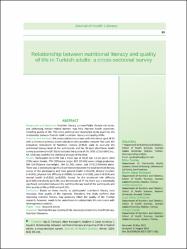| dc.contributor.author | Baş, Dilşat | |
| dc.contributor.author | Tontaş, Ebru | |
| dc.contributor.author | Kavuşan, Kerim Alper | |
| dc.contributor.author | Seçkiner, Selda | |
| dc.contributor.author | Schoinas, Ezgi Sakar | |
| dc.contributor.author | Kayak, Simge | |
| dc.date.accessioned | 2024-03-14T11:59:19Z | |
| dc.date.available | 2024-03-14T11:59:19Z | |
| dc.date.issued | 2024 | en_US |
| dc.identifier.citation | Baş, D., Tontaş, E., Kavuşan, K., Seçkiner, S., Schoinas, E., & Kayak, S. Relationship between nutritional literacy and quality of life in Turkish adults: a cross-sectional survey Journal of Health Literacy. Winter 2024;8(4): 89-103. | en_US |
| dc.identifier.uri | https://hdl.handle.net/20.500.12941/196 | |
| dc.description.abstract | Background and Objectives: Nutrition literacy is a modifiable lifestyle risk factor, and addressing literacy-related barriers may help improve health outcomes, including quality of life. This cross-sectional and descriptive study examines the relationship between Turkish adult’s nutrition literacy and quality of life.
Materials and Methods: We conducted online surveys with volunteers aged 18-65 with a minimum primary school education who provided consent. We used the evaluation Instrument of Nutrition Literacy (EINLA) scale to evaluate the nutritional literacy level of the participants and the 36-item short-form health survey questionnaire (SF-36) to evaluate the quality of life. SPSS v25.0 (IBM Corp., NY, USA) was used for the statistical analysis of the data. Results: Participants (n=1379) had a mean age of 33.89 (sd: 13.11) years; 1001(73%) were female, 776 (55%)were single, 822 (59.6%) were college graduates, 366 (26.5%)were overweight, 164 (11.9%) obese, and 177(12.8%)lived alone. There was a statistically significant correlation between the total nutrition literacy scores of the participants and their general health (r=0.220), physical function (r=0.351), physical role difficulty (r=0.088), function (r=0.253), pain (r=0.154) and mental health (r=0.213) (p<0.001). Except for the emotional role difficulty (p=0.128) and vitality (p=0.191) sub-dimensions of SF-36, there was a statistically significant correlation between the nutrition literacy level of the participants and their quality-of-life p<0.05 and p<0.001. Conclusion: Based on these results, as participants' nutritional literacy level increases, their quality of life improves. Therefore, this study confirms that improving nutrition literacy may positively affect the quality of life. Further research, however, needs | en_US |
| dc.language.iso | eng | en_US |
| dc.publisher | Iranian Association of Health Education and Health Promotion and Mashhad University of Medical Sciences | en_US |
| dc.relation.isversionof | 10.22038/jhl.2023.72377.1421 | en_US |
| dc.rights | info:eu-repo/semantics/openAccess | en_US |
| dc.subject | Beslenme okuryazarlığı | en_US |
| dc.subject | Nutrition literacy | en_US |
| dc.subject | Yaşam kalitesi | en_US |
| dc.subject | Beslenme eğitimi | en_US |
| dc.subject | Nutrition education | en_US |
| dc.subject | Sağlık okuryazarlığı | en_US |
| dc.subject | Survey questionnaire | en_US |
| dc.subject | Health literacy | en_US |
| dc.subject | Quality of life | en_US |
| dc.title | Relationship between nutritional literacy and quality of life in Turkish adults: a cross-sectional survey | en_US |
| dc.type | article | en_US |
| dc.authorid | Dilşat Baş / 0000-0002-2991-7774 | en_US |
| dc.department | Fakülteler, Sağlık Bilimleri Fakültesi, Beslenme ve Diyetetik Bölümü | en_US |
| dc.contributor.institutionauthor | Baş, Dilşat | |
| dc.contributor.institutionauthor | Kavuşan, Kerim Alper | |
| dc.contributor.institutionauthor | Schoinas, Ezgi Sakar | |
| dc.contributor.institutionauthor | Kayak, Simge | |
| dc.identifier.volume | 8 | en_US |
| dc.identifier.issue | 4 | en_US |
| dc.identifier.startpage | 89 | en_US |
| dc.identifier.endpage | 103 | en_US |
| dc.relation.journal | Journal of Health Literacy | en_US |
| dc.relation.publicationcategory | Makale - Uluslararası Hakemli Dergi - Kurum Öğretim Elemanı | en_US |

















